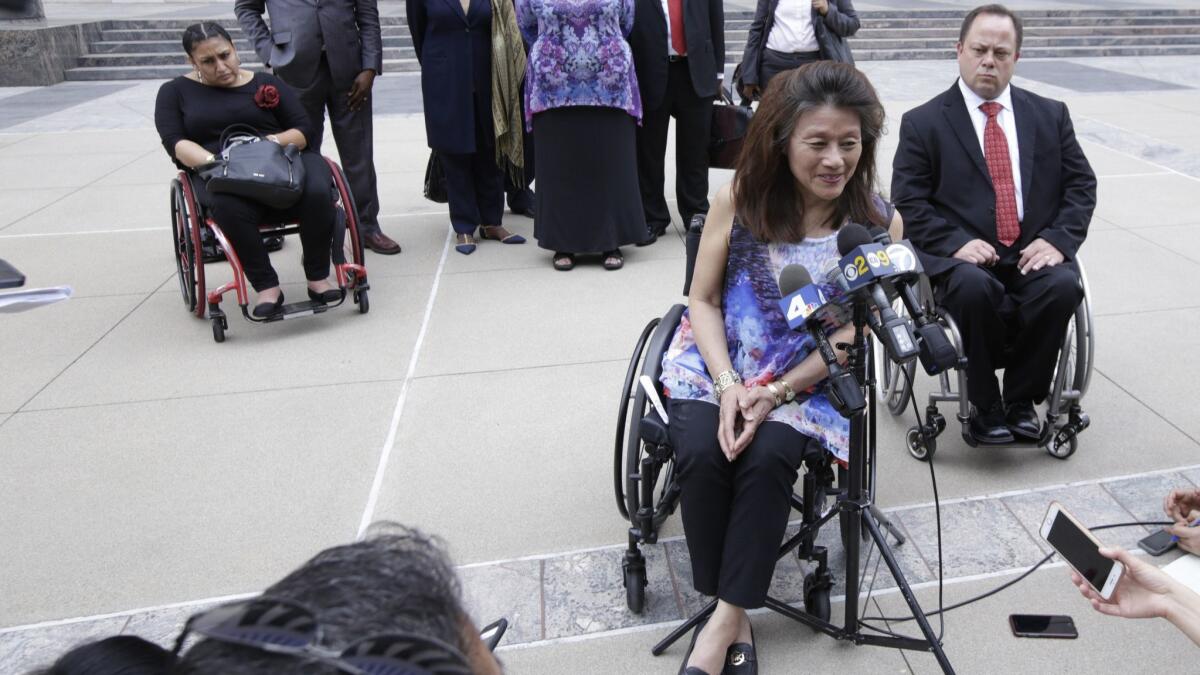After years of inquiries, L.A. still discriminates against disabled renters, feds say

- Share via
A Los Angeles program for developing affordable housing continues to discriminate against people with disabilities, producing kitchens, bathrooms, balconies and other living spaces that aren’t safely accessible to wheelchair users, federal officials said Monday.
In a 19-page letter, the Department of Housing and Urban Development said city officials failed to provide adequate oversight of the developers who built low-income apartments with federal funds.
As a result, those buildings do not comply with federal housing requirements and the Americans With Disabilities Act, the agency wrote.
The letter is the latest piece of bad news for the city on the disabled-housing front. Two years ago, the Department of Justice announced it had joined a whistle-blower lawsuit on the same topic, alleging city officials committed fraud by asserting that homes built with federal funds were fully accessible to wheelchair users, renters with hearing impairments and others with disabilities.
In Monday’s letter, HUD said investigators went to 16 federally funded housing developments in June 2017 and found that none of the accessible units in those projects complied with federal requirements.
That review followed two other federal inquiries into affordable housing in L.A, which also uncovered multiple violations.
“Sadly, the city continues to engage in a widespread practice of flouting federal laws that require taxpayer dollars be used to produce affordable housing that persons with disabilities can live in,” HUD Secretary Ben Carson said in a statement.
HUD officials said that since their 2017 review they had tried without success to reach an agreement with the city that would show that L.A. has addressed its outstanding violations and taken steps to ensure discrimination against renters with disabilities does not occur in the future.
The city, however, has shown a “sustained unwillingness to finalize” the terms of such a pact, federal officials said.
An aide to Mayor Eric Garcetti disputed that assertion, saying the city has spent years working to negotiate an agreement with HUD. The city takes compliance with federal accessibility standards “very seriously” and has submitted its own proposal for resolving the matter, said Garcetti spokesman Alex Comisar.
“We have spent countless hours negotiating in good faith with HUD on this matter, and we strongly disagree with the agency’s characterization of our role in this process thus far,” he said.
HUD officials said their 2017 survey of the 16 developments identified an array of design flaws, such as noninsulated pipes underneath sinks, which could result in “catastrophic burns” to the legs of people in wheelchairs.
Investigators also found closet doors measuring less than 32 inches, making them inaccessible to those using a wheelchair. Grab bars were placed at incorrect heights and locations, increasing the likelihood that a wheelchair user could fall when bathing.
Sinks and kitchen counters were more than 34 inches above the floor, rendering them unusable for wheelchair users, the agency said.
Federal law requires that 5% of units in certain federally funded apartment projects be accessible to people with mobility impairments. An additional 2% must be accessible to people with vision and hearing impairments.
HUD officials said those minimum thresholds were not met in some buildings. They also found “widespread” incidents where people without disabilities were living in units designated as accessible.
That back-and-forth between HUD and the city follows a decade of scrutiny over L.A.’s handling of accessible housing.
HUD informed the city in 2012 that it had found a “widespread failure” by the city to comply with federal disability rules. That same year, advocacy groups filed a federal lawsuit alleging that taxpayer-funded homes in L.A. did not have proper accommodations for wheelchair users and others with disabilities.
City leaders settled the case in 2016, promising to spend $200 million over a decade to ensure that 4,000 units are accessible to disabled renters, plus millions more on lawyers fees and other costs.
Initially, it appeared the city had begun addressing the long-standing criticism of its affordable housing program. In 2017, however, the Department of Justice announced it had joined a lawsuit on that very issue filed by the nonprofit Fair Housing Council of San Fernando Valley and North Hollywood resident Mei Ling, who uses a wheelchair.
At the time, City Atty. Mike Feuer promised to fight the lawsuit, calling it an “abuse of power” by federal authorities. He said the lawsuit, which raised the prospect of major financial penalties, would “deprive the city of crucial funds needed to address our housing crisis.”
Twitter: @DavidZahniser
More to Read
Sign up for Essential California
The most important California stories and recommendations in your inbox every morning.
You may occasionally receive promotional content from the Los Angeles Times.














